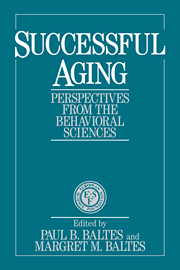Book contents
- Frontmatter
- Contents
- List of contributors
- Foreword
- Preface
- 1 Psychological perspectives on successful aging: The model of selective optimization with compensation
- 2 Medical perspectives upon successful aging
- 3 Successful aging in a post-retired society
- 4 The optimization of cognitive functioning in old age: Predictions based on cohort-sequential and longitudinal data
- 5 The optimization of episodic remembering in old age
- 6 Peak performance and age: An examination of peak performance in sports
- 7 Personal control over development and quality of life perspectives in adulthood
- 8 Successful mastery of bereavement and widowhood: A life-course perspective
- 9 The Bonn Longitudinal Study of Aging: Coping, life adjustment, and life satisfaction
- 10 Risk and protective factors in the transition to young adulthood
- 11 Avoiding negative life outcomes: Evidence from a forty-five year study
- 12 Developmental behavioral genetics and successful aging
- Name index
- Subject index
5 - The optimization of episodic remembering in old age
Published online by Cambridge University Press: 22 March 2010
- Frontmatter
- Contents
- List of contributors
- Foreword
- Preface
- 1 Psychological perspectives on successful aging: The model of selective optimization with compensation
- 2 Medical perspectives upon successful aging
- 3 Successful aging in a post-retired society
- 4 The optimization of cognitive functioning in old age: Predictions based on cohort-sequential and longitudinal data
- 5 The optimization of episodic remembering in old age
- 6 Peak performance and age: An examination of peak performance in sports
- 7 Personal control over development and quality of life perspectives in adulthood
- 8 Successful mastery of bereavement and widowhood: A life-course perspective
- 9 The Bonn Longitudinal Study of Aging: Coping, life adjustment, and life satisfaction
- 10 Risk and protective factors in the transition to young adulthood
- 11 Avoiding negative life outcomes: Evidence from a forty-five year study
- 12 Developmental behavioral genetics and successful aging
- Name index
- Subject index
Summary
Introduction
The purpose of this chapter is to survey the literature on aging and memory with special reference to the factors that promote the optimization of episodic remembering in old age. The overall objective of this enterprise is to identify and organize the variables that may contribute to our understanding of how and when older adults exhibit good memory performance. The review focuses on memory tasks that are episodic and explicit in nature, thus requiring conscious recollection of episodes encoded in a particular temporal–spatial context (e.g., lists of words encountered in the laboratory). Although microgenetic longitudinal studies in the form of research on memory training have received increasing attention from investigators during recent years, the bulk of empirical inquiry pertaining to the issue of memory optimization in old age is cross-sectional. This bias is reflected in the present review.
The concept of optimization is complex. It may be analyzed from a variety of perspectives and with different criteria. Taking the perspective that optimization is a concept that is related to the maximal performance level for a given individual in a given task, it follows that we have to know the absolute ceiling of performance for that individual in that task in order to make any definite statements about optimization. As far as the psychology of memory is concerned, determining an individual's performance ceiling in a given task is difficult. Although an individual may have reached the asymptotic level after, say, 3,000 trials, it is an open question what might happen after, say, 50,000 trials.
- Type
- Chapter
- Information
- Successful AgingPerspectives from the Behavioral Sciences, pp. 118 - 163Publisher: Cambridge University PressPrint publication year: 1990
- 42
- Cited by

